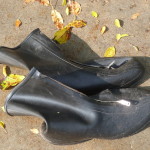 How can memory so deceive the eyes, and yet fail to deceive the heart? C:8.28
How can memory so deceive the eyes, and yet fail to deceive the heart? C:8.28
Our place in the pattern of God’s creation “is not a place of physical form but a place of holiness, an integral place in the pattern that is oneness with God. It is a place you have never left but that you long for, believing that you know it not. Your life here is much like a search for your story. Where will this chapter lead? What will the end be like? Was one event a mistake and another a blessing in disguise? You seek to know your story’s table of contents, or at least a brief outline. Where does your life fit in the larger picture? And yet, you realize that—like reading a story—when the end is reached and all is known, the story is over except in memory and reflection and perhaps in speculation. C:26.24
A morning filled with rain, thunder and lightning, it required me to put on my  galoshes for the trek to the cabin, a pair I inherited from my father-in-law Ed. I love zipping my feet, complete with socks and shoes, into their black rubber.
galoshes for the trek to the cabin, a pair I inherited from my father-in-law Ed. I love zipping my feet, complete with socks and shoes, into their black rubber.
 A few hours later, after the rain left, and the sun came out, I went walking, swinging my arms with the joy of early morning and the shower that kept pelting me like grace as I moved beneath the dear trees of my neighborhood. I will likely move in the next year, and I feel that each day I am creating and preserving memories.
A few hours later, after the rain left, and the sun came out, I went walking, swinging my arms with the joy of early morning and the shower that kept pelting me like grace as I moved beneath the dear trees of my neighborhood. I will likely move in the next year, and I feel that each day I am creating and preserving memories.
I’ve also been reviewing the paper trail of my life. Along the way I find all kinds of writings, some about my experience of this Course, like the one I shared in last week’s post. I have sought “the actual” to compliment memory. Yet at times I feel that my memory is more accurate than what I’ve found.
Yes, the details are nice. The dates, the historical facts. They may even be necessary. Yet how I feel—looking back from today—and how I felt then, are so often different. Have you ever felt this? Have you felt the ability of memory to transform the past? Memories of childhood? Memories of the breakup of a love relationship? Memories of a loved one who died? Memories even, of who you once were, what you believed, who and what you had faith in?
“Memory” is an incredibly rich theme within A Course of Love:
You can look back on your life and see its form. You could write an autobiography describing every experience you encountered between your earliest memory and the present moment and it would say nothing about you if it related the experiences only as physical events. Your experiences may, in their totality, be called your life, but they cannot be called you. You stand apart. And yet in your choice of, and response to your experiences were you revealed, because, in this way only, were you a creator. D:Day36.3
There are so many ways memory is spoken of. It begins in the Course, where there are multiple references to our memory of God’s creation:
It is because you remember love as that which kept you safe, that which kept you happy, that which bound all those you love to you, that you attempt to use love here. This is a real memory of creation that you have distorted. Your faulty memory has caused you to believe love can be used to keep you safe, to make you happy and bind to you those you choose to love. This is not the case, for love cannot be used. C:9.3
The same is true of our memory of relationship. We have remembered “that all things exist in relationship, and that all things happen in relationship.” (C9.4) With this too, we seek to make use of this memory, not realizing that relationship cannot be used.
Memory is spoken of more broadly as well: “The memories of your heart are the strongest and purest that exist.” (C9.12) Their remembrance will help to still our minds and reveal the rest.
There is even an experiment in observing the body that leads to an unorthodox conclusion. After participating, “You will remember the urge to laugh gently at yourself and the expanded vision as well. You will remember that for a moment your body did not seem to be a boundary that kept you contained within its limitations. Then you will remember that this is but a Course in remembering and that memory is the language of the heart.” C:10.31
In The Treatises, especially A Treatise on the Art of Thought, memory is linked to mindfulness and our ability to live what we have learned:
A Course of Love has provided you with what you need to know, which is the function of all coursework. This does not mean that you have acquired the ability to live what you have learned, only that you are ready to. The very word “remember,” as well as the concept of memory, implies mindfulness and the ability to reproduce or recall both what has been learned and what has been previously experienced. This reproducing and recollecting are acts of creation. They do not bring back a reality that once was but transform that reality into a present moment experience. It is in the present-moment experience memory provides that truth rather than illusion can now be experienced and learned from. It is in the present-moment experience that you will receive the blessing of being able to respond differently to love. T1:1.4
I love this one and the idea that we are not called to reinterpret memory but to respond newly:
[T]he first opportunities for you to learn the art of thought will be provided through what we have called the re-experiencing of memory. These are opportunities to re-experience the lessons your life has brought you. You will experience the same lessons in the same way, rather than in a new way, if you meet these experiences again with the attitude of interpreting them rather than responding to them. They do not require interpretation but response. Response was what was required in the first place and your inability to respond need not be repeated. You are being revisited with these lessons expressly for the purpose of not repeating your former reaction or interpretation of them. You are being revisited with these lessons so that you may apply to them the art of thought rather than the thinking of the ego-mind. The art of thought will reveal the truth to you. T1:4.21
Most poignantly perhaps, is that I have found that memories truly do have the ability to transform and so to be transformative.
I could go on and on, but I’ll conclude as the Dialogues conclude, recognizing once again, how we travel through the whole gamut of the human . . . to the divine.
Everyone carries the memory of I Am.
Day 39.34:
What memory of I Am will you carry with you now that you know that I Am is who I am and who you are? What memory has this Course and this Dialogue returned to you? What memory is without attributes because it is who I Am and not a projection? Only love. What memory is not a memory, but your identity? Only love.



Laura, Thank you for engaging with me on this subject of memory. It has been a strange time for me too, even with writing. Re-visiting old writing can be so odd. And I feel that you reminded me of the reason for it and why I like my journal writing above my other writing. In “other” writing, I do “interpret.” In journal writing, I hardly ever do. Journal writing is me being me, unvarnished. Which reminds of a dream I had once that had something to do with me “being” varnished. It was a great image for me…like sprucing myself up with something false and glossy! I’m feeling that “being who we are”, that particular freedom, must be something like journal writing. Or like being a sixth grader!
F. Scott Fitzgerald is a pretty regular figure in the Twin Cities literary scene. There was an article recently. It was about a 1911 school textbook of his in which he described himself as: playwright, poet, novelist, essayist, philosopher, loafer, useless, disagreeable, silly, talented, weak, strong, clever, trivial, a waste.” The man from the historical society who was talking about the book said, “He’s like any 15-year old boy. He’s just totally full of himself. But how self-aware to know he’s going to be a novelist, to know he has weaknesses, to know he can be lazy. ” He called the document extraordinary. I don’t know. Maybe that’s all interpretation. But maybe it was simply how he felt, what he dreamt, and I’ve held onto this bit of newspaper because of it, waiting for a moment to share it.
Family turmoil seems to go through cycles and I’m in one of them as well. Such times do seem to pull up memories that want to be expressed, and I know just what you mean about falling into them in a way that could engulf you for a while. Writing is always a courageous act, full of heart, able to empty and fill us at the same time. And even if we can’t always “be who we are” in the world, it’s got so much to reveal to us, especially in the training it is to “let it happen.” I’m with you there and wishing you the space for that necessary “taking over.”
Dear Mari,
Thank you for your reply. I found the quote about Fitzgerald very interesting. I liked the paradox of how he described himself. It’s always reassuring to encounter that in others. There are big patches of my life I do not want to revisit. Wild times I am ashamed of. But there was beauty in all of those times, here and there, and I think I need to begin writing about them some, at least a bit. As I watch a family member struggle with addiction, I remember those dark days in my own life, and that remembering is painful but feels necessary. I recently had a conversation with someone whom I haven’t seen in 20 years, and he remembered me as someone altogether different in many ways than who I like to think I am now.
Sorry to be so unfailingly self-referential here. Thank you for “holding space” for the necessity of letting go, for me. Even if you only had that thought once, it means a lot. I hope you are able to feel peaceful—or whatever you need to feel, I suppose—in your time of family turmoil.
Blessings,
Laura
Mari, this post is, as is almost always true, so resonant for me. I’ve been thinking about my childhood a lot the past few days and wanting to write about it, about the joy of growing up with my kind and talented and loving parents and brother and grandma out in the Georgia countryside, about the little rituals and patterns of life and how they have colored and formed my world. I keep kind of bumping up against this notion of interpretation, though, and it was a relief just now to be reminded that interpretation isn’t something I need to get right or even try to do at all when it comes to these memories. I listen to my sixth graders write their stories every day (we read our writing aloud when they want to) and they very often begin not knowing where their reflections and memories will take them. It’s beautiful to watch their stories become something they respond to, something that lives in them. I find that when I write with them, that happens for me too, but for some reason I have such resistance to writing of late. I want to do it so much and yet I hold back, as if letting it happen (not doing it, but letting it happen!) would just take me over. And it might, I suppose….but that feels necessary suddenly. I suppose it’s about trust. I still struggle with that, I admit. I am shaking my head, still, at how relevant and important this post of yours feels to me. It may be that the turmoil my family seems to be currently experiencing on several fronts is part of what’s calling this feeling, this urge out in me. At any rate, it also feels like a kind of permission has been granted….not that I really needed it, but it’s a good feeling nonetheless.
Much gratitude,
Laura
In the theme of memory… Very meaningful today for me. Remembering who I am. Spirit.
ACOL. 8.30 Rejoice that your heart is not deceived, for herein lies your path to true remembering.
Rose